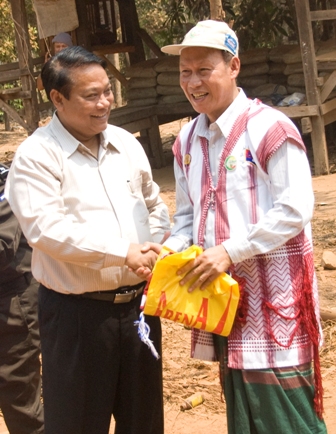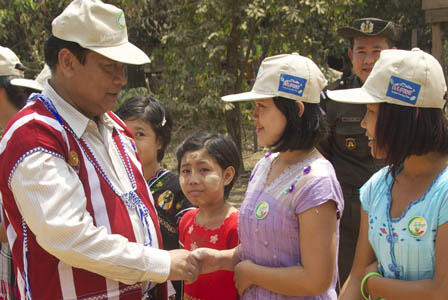THAN BYU ZAYAT, Kayin State, Myanmar — “Up to now, we never had the opportunity to know how many people live in our part of the world,” observed Gen. U Shwe Maung, commander of the Karen National Union’s Brigade 6. Now finally at peace after decades of war, his territory in south-eastern Myanmar is taking part in a national census for the first time.\

“This census will give us information we need to plan the future of Karen state,” he said.
The general accompanied Minister of Immigration and Population U Khin Yi and senior UN officials in Myanmar on a brief tour of enumeration activities in five villages, in an area controlled by the Karen National Union (KNU), on day nine of Myanmar’s nationwide census.
After several months of discussions with the Government, KNU Brigade 6 agreed to cooperate in the census. One hundred sixty participants nominated by the KNU, mostly local teachers on their summer break, were trained as enumerators in mid-March and began collecting data from households a week later. By 8 April, they were nearly finished.
Several were observed by the visitors as they interviewed residents and filled in the census questionnaire. None reported any problems or misunderstanding of the questions. One said that on the question about ethnicity, most respondents had identified themselves as Karen, rather than one of the listed sub-categories of that group.
The warm welcome accorded to the Minister and his party was noteworthy. Just two years ago, the KNU and the Government were still at war, and locals frequently had to flee their homes to escape enemy attacks.
“Now we are no longer afraid, and we don’t have to keep running away from soldiers,” said a 19-year-old student who studies physics at Hpa-an University.
U Khin Yi is an Army veteran who was badly wounded in a 1978 battle that failed to drive out the Karen fighters. When the country’s last census took place five years later, it could not be held in this KNU-controlled area, leaving tens of thousands of people uncounted.
Now that it is cooperating with the KNU, the Government has identified villages that were not even on its enumeration maps. The former antagonists are also collaborating on a massive road-building effort.
At a lunch with local residents U Khin Yi said the census would spur further development. “Getting counted for the first time,” he said, “is a ray of hope for the people of this area.”


